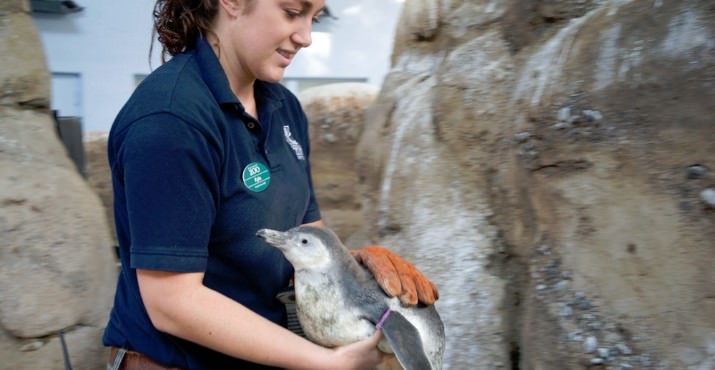Portland, June 22nd, 2013. The five new Humboldt penguin chicks that hatched at the Oregon Zoo this spring have begun to emerge from their nest boxes and explore their surroundings, keepers say. The young penguins are easy to identify: they are gray all over and lack the black-and-white markings of adult Humboldts — notably the distinctive horseshoe-shaped band in the chest area. In the photo, Keeper Kyla Holligan holds a young Humboldt penguin at the Oregon Zoo. The five chicks that hatched this spring have begun to emerge from their nest boxes and explore the zoo’s penguinarium. (Photo by Michael Durham, courtesy of the Oregon Zoo.)
Keepers have named the chicks after well-known conservationists, wildlife experts and scientists:
- · Irwin (for Australian wildlife expert and “crocodile hunter” Steve Irwin)
- · Attenborough (for English nature historian David Attenborough)
- · Jane Goodall (for the renowned chimpanzee expert and conservationist)
- · Tesla (for the famous scientist and inventor Nikola Tesla)
- · Linus (for Nobel prize winner and Portland native Linus Pauling).
Visitors can see the young birds waddling over the rocky terrain and darting through the clear water of the zoo’s penguinarium. (Penguins start swimming right away, and don’t need lessons the way young river otters do.)
It is the first time in four years visitors are able to see penguin chicks in Portland. The zoo’s breeding program had been on hiatus, in part due to renovations at the zoo’s penguinarium. The penguinarium reopened to the public last November, following a much-needed upgrade of its water-filtration system, one of many sustainability improvements funded by the community-supported 2008 zoo bond measure. The upgrade saves 7 million gallons of water each year.
Humboldt penguins (Spheniscus humboldti), which live along the South American coastline off of Peru and Chile, are classified as “vulnerable” by the International Union for Conservation of Nature, and in 2010 were granted protection under the U.S. Endangered Species Act. Of the world’s 17 penguin species, Humboldts are the most at risk, threatened by overfishing of their prey species, entanglement in fishing nets, and breeding disruption due to commercial removal of the guano deposits where the penguins lay their eggs. Their population is estimated at 12,000 breeding pairs.
Through its Future for Wildlife program, the Oregon Zoo has long supported Peru-based conservation organization ACOREMA’s work to protect the vulnerable Humboldt penguin. ACOREMA monitors penguin mortality and works closely with San Andrés fishermen to mitigate the practice of hunting penguins for food. The group also trains volunteer rangers, reaching out to 3,000 students, teachers and Pisco-area residents a year to raise awareness about penguin conservation.
The zoo is a service of Metro and is dedicated to its mission of inspiring the community to create a better future for wildlife. Committed to conservation, the zoo is currently working to save endangered California condors, Oregon silverspot and Taylor’s checkerspot butterflies, western pond turtles and Oregon spotted frogs. Other projects include studies on Asian elephants, polar bears, orangutans and giant pandas. Celebrating 125 years of community support, the zoo relies in part on donations through the Oregon Zoo Foundation to undertake these and many other animal welfare, education and sustainability programs.
The zoo opens at 9 a.m. daily and is located five minutes from downtown Portland, just off Highway 26. The zoo is also accessible by MAX light rail line. Visitors who travel to the zoo via MAX receive $1.50 off zoo admission. Call TriMet Customer Service, 503-238-RIDE (7433), or visit www.trimet.org for fare and route information.
General zoo admission is $11.50 (ages 12-64), $10 for seniors (65 and up), $8.50 for children (ages 3-11) and free for those 2 and younger; 25 cents of the admission price helps fund regional conservation projects through the zoo’s Future for Wildlife program. A parking fee of $4 per car is also required. Additional information is available at www.oregonzoo.org or by calling 503-226-1561.
















